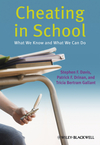Getting Away With It: The Classroom Cheating Epidemic and Its Prevention
 Cheating in School: What We Know and What We Can DoISBN: 978-1-4051-7804-4
Paperback
268 pages
August 2009, Wiley-Blackwell
This is a Print-on-Demand title. It will be printed specifically to fill your order. Please allow an additional 10-15 days delivery time. The book is not returnable.
Learn more about this book
|
|||||||
Getting Away With It: The Classroom Cheating Epidemic and Its Prevention
"This is perhaps the most comprehensive and accessible text on the topic of academic integrity. The authors look beyond the individual to the broader institutional and societal milieu, but always with optimism. A carefully and elegantly constructed presentation of the field."
—Tracey Bretag, Editor, International Journal for Educational Integrity
The media has portrayed cheating in the classroom in near epidemic proportions, in all levels of education and all types of learning institutions. The public is hard-pressed for strategies: Do we put the blame on the student exclusively and label the student as a bad apple? Do we blame the parenting practices of the parent or the teaching practices of the educator? To some, the punishments for cheating seem too lenient to combat the prowess of the media-savvy 21st century student.
As the technology available to kids gets more sophisticated and young people are more likely to text their best friend before even eating a square meal, educators and parents are finding it hard to keep up. Authors Stephen F. Davis, Patrick Drinan, and Tricia Bertram Gallant address these concerns in their new, unparalleled, and definitive roadmap to cheating prevention, CHEATING IN SCHOOL: What We Know and What We Can Do (Wiley-Blackwell; $21.95; September, 2009). Together, the authors present over thirty years of research and insights which will equip parents, educators, school administrators, as well as the average lay person, with the tools required to make cheating in the classroom a problem of the past.
With a comprehensive focus on the cheating phenomenon from primary school through graduate school, this is the first book of its kind to move beyond internet plagiarism to cover all of the pitfalls of cheating. The authors of CHEATING IN SCHOOL: What We Know and What We Can Do (Wiley-Blackwell; $21.95; September, 2009) expertly relay facts in a clear and straightforward format. The book uniquely features narrative-style testimonials and feedback from the students themselves, combined effortlessly with empirical research. It is intended for all teachers, administrators, students, parents, and the general public interested in improving and retaining academic integrity in the modern classroom. Here is a sample chapter overview:
- Chapter One: Cheating in Our Schools, Colleges, and Universities: A Critical Problem for the Twenty-First Century. Outlines how cheating is manifested and justified in the modern, competitive academic environment, and its long-term effects on personal and institutional character.
- Chapter Two: The Nature and Prevalence of Student Cheating. Pinpoints the history of the phenomenon, case studies and statistics, with an international cross-comparison.
- Chapter Three: Reasons for Academic Dishonesty—Situation, Disposition, and Changing Times. Explores the evolution of cheating behavior and the more deep-seated psychological issues which keep the behavior in play.
- Chapter Four: From Cheat Sheet to Text Messaging—The Evolution of Techniques. Considers different venues for cheating opportunities: classroom tests, lab reports, internet plagiarism and online classes in the context of cheating prevention.
- Chapter Five: Short-Term Deterrents—Strategies for Class, Labs, and Online Testing. Discusses detection methods, penalties, and deterrents for each of the venues outlined in the previous chapter.
- Chapter Six: Long-Term Deterrents—Development of Individual and Institutional Integrity. A focus on moral development and ethical solutions on both an individual and institutional level.
- Chapter Seven: The Call for Action and Wisdom—Conversations That Make a Difference. An emphasis on accountability and communication within institutions and at home, as well as the power of mentor-based models.
- Chapter Eight: Refining Our Tactics and Strategies. Proposal of different types of practical reform strategies (“crusading,” “challenging,” “modest, or “gestural”) that parents, teachers, and institutional leaders can practically implement.
- Chapter Nine: An Optimistic (and Provocative) Conclusion—Finding the Good in Student Cheating. Observations from experts including Newsweek’s Dr. Fareed Zakaria on the broad and powerful societal influences facing kids today, and how they can be used as a basis for creative and meaning-based learning.
CHEATING IN SCHOOL: What We Know and What We Can Do
By Stephen F. Davis, Patrick F. Drinan, Tricia Bertram Gallant
Paperback: ISBN: 978-1-4051-7804-4; 216 pp.; $21.95; September 2009







